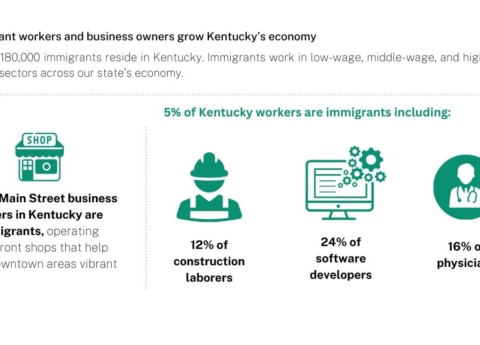Official economic data and a close look at corporate investment announcements contradict the story that recent controversial policy choices are driving an economic revival in Kentucky, according to a new report by the Kentucky Center for Economic Policy (KCEP).
The report, “Kentucky’s Economic Performance Falls Short of Claims Based on Corporate Announcements,” examines the Kentucky Cabinet for Economic Development’s widely-publicized 2017 report identifying $9.2 billion in corporate investment announcements. KCEP finds that, in many cases, no new jobs are connected to the announcements and the vast majority are from companies that were already doing business in Kentucky before recent policy changes. In addition, the announcement report presents a one-sided picture because in 2016 the Cabinet stopped publishing a companion report on facilities closing down and eliminating jobs. A fuller picture of economic activity is provided by official economic data, which shows that job growth — including manufacturing job growth — has slowed in Kentucky the last couple of years.
“There is a narrative that Kentucky’s economy is now growing faster, a claim often attributed to policies like Right to Work,” said Jason Bailey, Executive Director of KCEP. “But when you look at the actual data, you find nothing extraordinary about investments or jobs, and in fact Kentucky has seen a troubling slowdown in job growth.”
Among the brief’s findings:
- 34 percent of the $9.2 billion in announcements for 2017 were not attached to new jobs, and 48 percent will result in no new jobs if the Braidy Industries project does not materialize.
- 82 percent of the announcements were from businesses already operating in Kentucky. 42 percent of the total investment was by Ford, Toyota and Amazon, which were making regular investments and doing business in Kentucky long before recent policy changes.
- Kentucky has added only 700 net new jobs a month on average in the 21 months since the Right to Work law passed, in contrast to 2,100 net new jobs a month in the 21 months before the law passed, according to Bureau of Labor Statistics employment data. The state has added only a net 1,000 manufacturing jobs total since the law was enacted compared to 13,600 net manufacturing jobs in the same amount of months before it became law.
- The state’s economy is also underperforming both the region and the nation as a whole. Since Kentucky’s Right to Work law passed, jobs have grown 0.8 percent in Kentucky compared to 2.8 percent for the U. S. and 3.1 percent for the South.
As the report notes, rigorous research finds most state job creation is not the result of luring companies from elsewhere, but through the start-up of new businesses and the expansion of existing companies. Lower labor standards and policies such as expanded tax breaks are not linked to stronger economies. Instead, prosperity results from a good education system, a modern infrastructure and a high quality of life — all of which can be eroded by tax breaks and policies that reduce workers’ standard of living.
“Kentucky should rely on accurate indicators and solid research to measure the strength of our state economy and to understand the impact of policies on economic well-being,” said Bailey. “One-sided announcements of potential investments do not tell the full story, for which we must rely on official data produced by entities like the Bureau of Labor Statistics and careful research about which policies make a positive difference – and which do more harm than good.”

